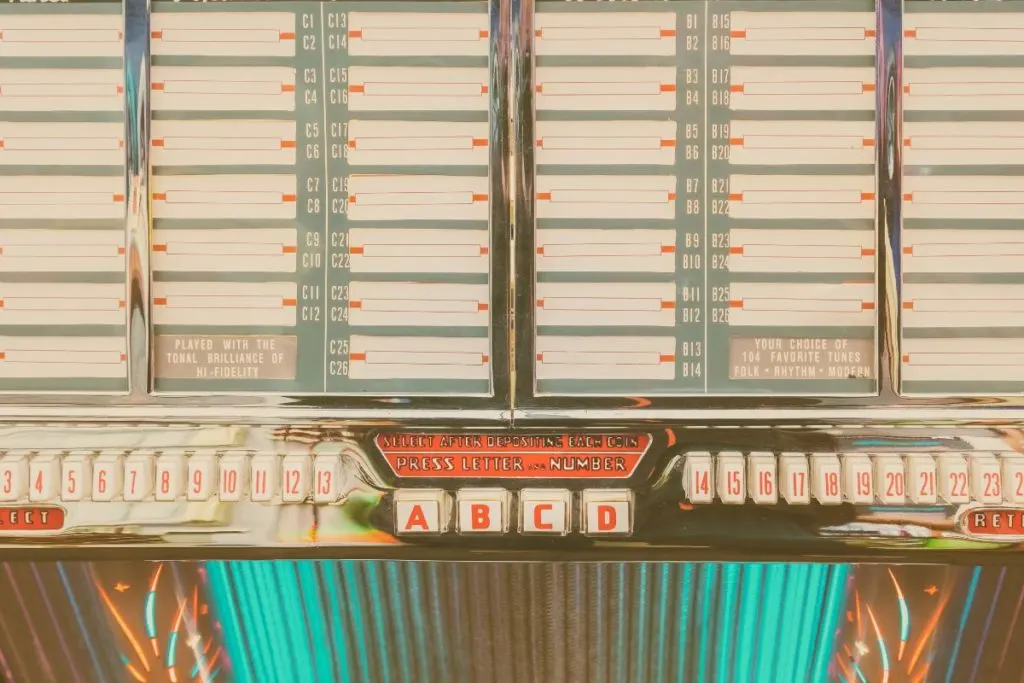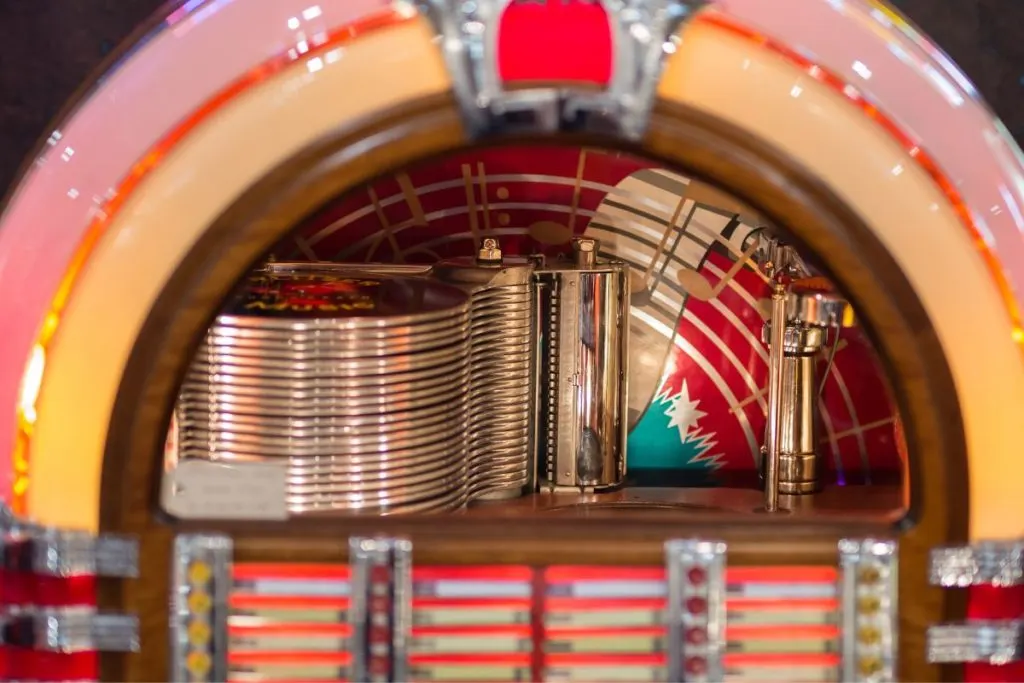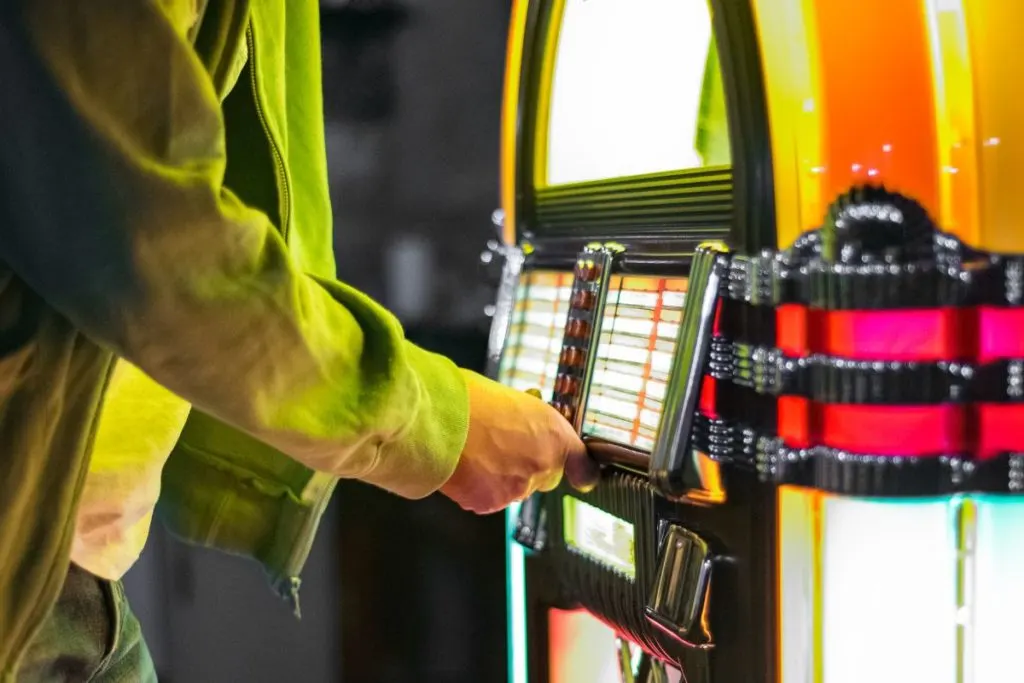*This post may contain affiliate links. As an Amazon Associate we earn from qualifying purchases.
The image that comes to your mind when you think of a jukebox is a cabinet shape, bright colors, and a shiny exterior. Jukeboxes were especially popular a few decades ago when music was much more expensive and much less accessible.
Are jukeboxes a good investment? If you are looking to purchase a jukebox and just have it sit in your house and hope it appreciates then it probably isn’t a good investment. If instead you are planning on putting it in a location where you could make money with each play then it could be a fine investment.
Another way where jukeboxes could be a good investment is buying a damaged or worn out jukebox and restoring it to its former glory. Of course that requires a lot of time to be invested but for many people that is better than investing their money.
The objective of investing is to make money, but sometimes investments lose value. The key factors for planning an investment strategy are trying to reduce the risk before you start investing, look at your financial situation, and look at the historical performance of what you want to invest in.
Over time a vintage jukebox will normally appreciate in value as long as it’s kept in good condition. There are many people who want to experience the joys of their childhood again so jukeboxes and other retro machines have increased in popularity over recent years.
Whether that trend will continue into the future is anyone’s guess but as of now original jukeboxes are certainly going up in value.
Do you have a game room in your house and you wish that you had a full-sized jukebox to put into it? Well, you are in luck as you can find a variety of them to choose from by clicking here.
Do you love the thought of a nostalgic jukebox but can’t afford to spend thousands on it?
Then this tabletop jukebox is for you.
Looking and feeling like an old time jukebox but sitting on your counter or table you really can’t go wrong with this one.
Investing In A Classic Jukebox
The jukebox will remain a nostalgic icon, a legend in the fabric of the social culture of America. In the past, manufacturers decided to re-release their most popular jukebox models, hoping that they would become popular again, but it did not work.
People are far more interested in owning a real classic jukebox than they are a tabletop model that streams via bluetooth. There is just something special about having a real machine rather than a reproduction.
Technology has changed the face of music. MP3 players, smartphones, and digitized music albums have replaced the CD and record collections of yesteryear. Now there are digital jukeboxes with a touch screen that can connect with other devices to access a variety of music libraries.
The classic jukebox is still reliable. The interest in retro and nostalgia are fueling the demand of these items, and with the internet at its peak finding machines locally or around the world is becoming much more simple. Whether digital or physical jukebox, they each provide a special experience to the listener.
General factors To Consider Before Investing In Jukeboxes
Investing carries risk for your money, but you can get a higher return if the investment pans out. If you decide to save your money for the long term, it will be affected by inflation. The interest earned from savings can’t cope with rising inflation so investing your money is the best way to keep it growing. Putting your money in an investment where it will increase in value is no easy task. There are some important things to consider before you buy a jukebox as an investment.
Those things are:
- Your goal for investing
What is your goal for the investment? If you are wanting to buy a jukebox and place it in a local bar or retro style restaurant then that is probably a better investment than to let it sit in your basement for years. However, having a machine at a business requires you to check it regularly, to remove money from it, to share revenue with the business owner, and many other things.
A jukebox is much more of a hands on investment than buying stocks or bonds.
- Your age
The younger you are the less likely it is that a jukebox is good as an investment. Since it requires more time than traditional investments than a person who is younger, has a family, etc. will probably find it to be way too much work for not enough money.
If you are retired or nearing retirement it might be a better option. You will remember the jukeboxes of yesteryear more fondly which should help you appreciate them more. You will also have more time to do the running around and checking on them on a regular basis if you are retired or your kids are all grown.
- Rick Tolerance
A jukebox isn’t a giant risk since the initial outlay is going to be a smaller amount (assuming you aren’t buying a bunch at once). Obviously a jukebox could be a much better investment than stocks and bonds but it could be far more ricky as well.
For example what happens if someone breaks the machine the first weekend you have it at a business? You are now having to spend additional money before you have ever made a dime. You also have to consider what might happen if the nostalgia fad passes.
If people are too busy streaming music on their phones to care about your jukebox in the corner your investment could become worthless quickly. Realizing that is a possible risk is important before you ever buy a jukebox.
- Investment Mix
Having a jukebox or two at local businesses isn’t a bad choice. However buying a truckload of jukeboxes and investing your entire savings into it is not a good plan! As with any investment you will want to stay properly diversified and not place all of your savings or retirement into jukeboxes!
Having a few jukeboxes, pinball machines, and other retro type items can be great just make sure it is a very small percentage of your total net worth that is tied up in those type of investments.
- Have Emergency Funds
There is no way to know if a jukebox will break down or be broken by a customer. If you don’t have any extra money set aside then you could have to pull the machine out of the business and lose the entire investment.
It is a good idea to set aside some of the money from the profits for repairs and even replacement of the jukebox in the future. Don’t spend all the money that they are making and expect the jukebox to last forever. It won’t happen.
- Location Risk
There will be different amounts of risk associated with your jukebox depending on where you have it at. If you have it in a dive bar in the worst part of town then it is far more likely to get damaged or broken into than if it is in a restaurant that is right across the street from a police station.
Each location that you place the jukebox in will have risks but some will be more risky than others. Just because some places are more risky doesn’t mean that you will make more money there either!
Make sure to choose a location for your jukebox carefully.
Six Things To Look At When Buying Jukeboxes
For you to buy a modern jukebox, it’s an expensive undertaking. For you to know a good jukebox, you don’t have to be Justus Seeburg. What you need to do is do a little bit of searching.
Brand.
There are various jukebox brands. Some are Seeburg, Wurlitzer, Rock-ola, and Ami. Each has pros and cons. Go through the customer reviews of each and pick the one with the least drawbacks.
Condition
This depends on the money you want to spend. A fully restored jukebox is more expensive than one that is unrestored. You can go for a replica jukebox, which is just an imitation of the real jukebox but will often have more features and less upkeep required.
You can also choose to buy one that is in horrible shape. That way you are investing some time and energy instead of money.
Price
The prices vary from one brand to another. Go for one that is budget friendly and that you can afford. Just because one brand is more expensive doesn’t necessarily mean that it is better or will make you more money.
Remember, if you are trying to have a good investment you will have to have twice as many purchases to pay for a machine that is twice as expensive.
Warranty
This is essential to look at when buying a jukebox. Picture this after using it for a few weeks it stops working. Will you get a replacement or repair, or will you have to put out the money and buy another one? Buying from a company that issues a warranty, is a way of showing you that their jukebox is trusted and high enough quality for them to stand behind.
Of course if you buy an older jukebox then it won’t come with a warranty but the lower price that you pay should allow you to pay for repairs.
Sound output
Analog jukebox and classic ones produce different sounds. Same case with new ones and second hand ones. Your interest in sound output will help you make a decision on which jukebox to buy. Take some time and test a few different brands or models before you purchase.
Aesthetics
Each person will prefer a different style of jukebox. Normally the more flashy and colorful that it is the better since you will be trying to draw attention to it in the business that you have it placed at. You will want your jukebox to not be ugly however as you need the business owner or manager to like that it’s there and not hate it!
Home Use
If you are looking to buy a jukebox for your home and are trying to convince someone that it is a good buy…. It probably isn’t. Sorry! However they have made many different reproductions that are designed to fit on your table and can be purchased quite cheaply.
Check out this video of an unboxing and review of one of those smaller jukeboxes.

The appeal of jukebox models
There’s no denying the nostalgia factor of jukeboxes. These machines harken back to a simpler time when you didn’t need a smartphone to access all the music in the world.
Just drop in a couple of coins, make your selection, and let the good times roll.
But it’s not just the nostalgia that makes jukeboxes appealing. These machines have a certain cool factor that never seems to go out of style.
Jukeboxes have been featured in countless movies, TV shows, and music videos, cementing their place in popular culture. Who wouldn’t want a little piece of that coolness in their own home or business?
Plus, let’s be real – there’s something undeniably satisfying about physically selecting a song on a jukebox rather than just tapping a screen. It’s a tactile experience that streaming just can’t replicate.

Types of jukeboxes
So you’re sold on the idea of owning a jukebox. But what type should you go for? There are a few options to consider.
First, there are digital jukeboxes. These use a computer to store and play music and often come with a touchscreen for selecting songs.
The advantage of digital jukeboxes is that they can hold a virtually unlimited number of songs, and it’s easy to update the selection. They also tend to be more reliable than their antique counterparts.
On the other hand, antique jukeboxes are a popular choice for collectors and those looking for that authentic vintage vibe. These beauties are true works of art, with intricate detailing and colorful light displays.
The downside is that they can be expensive to purchase and maintain, as vintage parts can be hard to come by and may need to be specially ordered or fabricated.
Custom jukeboxes are another option. These are typically made to order and can be tailored to your specific tastes and needs.
Want a jukebox shaped like a giant Elvis head? No problem! Just be prepared to pay a pretty penny for the privilege.

Operating and maintenance costs for a vintage jukebox
So you’ve decided on the perfect jukebox for your needs. But before you get too excited, it’s important to consider the ongoing costs of operating and maintaining your new toy.
First, there are the music licensing fees. Most jukeboxes require a license to play music publicly, whether it’s a digital or antique machine.
The cost of this license will vary depending on the size of your establishment and the number of songs you want to offer.
Then there’s regular maintenance. Just like any other machine, jukeboxes require regular upkeep to keep them running smoothly. This can include cleaning, lubricating moving parts, and replacing worn-out parts.
The frequency and cost of maintenance will depend on the type of jukebox you own and how heavily it’s used.
If you choose an antique jukebox, be prepared for additional costs. Vintage parts can be expensive and hard to come by, and you may need to hire a specialized repair person to fix any issues. These costs can quickly add up, so it’s important to factor them into your budget.
Potential income from a jukebox
If you’re considering a jukebox for your business, you may be wondering if you can earn some extra cash from it. The potential for earning income will depend on the location of your jukebox and the type of establishment you own.
If you have a jukebox in a bar, arcade, or other high-traffic location, you may be able to earn some decent coin (pun intended) through its operation. Customers will drop in their quarters to play their favorite tunes, and you’ll get a cut of the profits.
Just keep in mind that you’ll also need to factor in the music licensing fees and any other operating costs.
On the other hand, if you have a jukebox in a low-traffic location or in your own home, the earning potential will likely be much lower. You may still get some enjoyment out of it, but don’t expect to make your fortune from your jukebox.
Risks and drawbacks of owning a jukebox
While owning a jukebox can be a fun and nostalgic experience, it’s important to be aware of the risks and drawbacks.
If you have a jukebox in a public location, there’s always the risk of vandalism or theft. These machines can be expensive to repair or replace, so it’s worth considering insurance to protect your investment.
Another risk to consider is the potential for the jukebox market to decline or change.
While these machines have remained popular for decades, there’s no guarantee that they will continue to do so. It’s worth keeping an eye on the market and the overall demand for jukeboxes before making a big investment.
Finally, if you opt for an antique or custom jukebox, there are additional risks to consider. Antique machines can be prone to breakdowns and may require costly repairs. Custom jukeboxes may also be more expensive and harder to resell if you decide to part with them down the line.
Conclusion
Investing in jukeboxes can be a good investment if you purchase it for the right price and make sure that you find a way for it to make money. If you are just purchasing a jukebox to put in your home that is fine but it probably won’t increase in value and shouldn’t really be classified as an investment.

